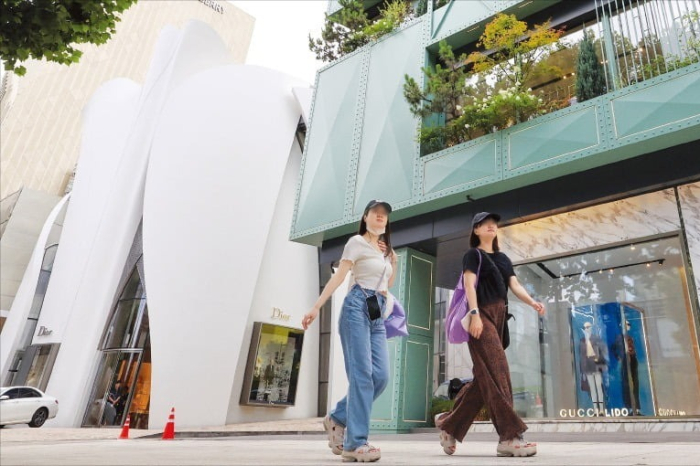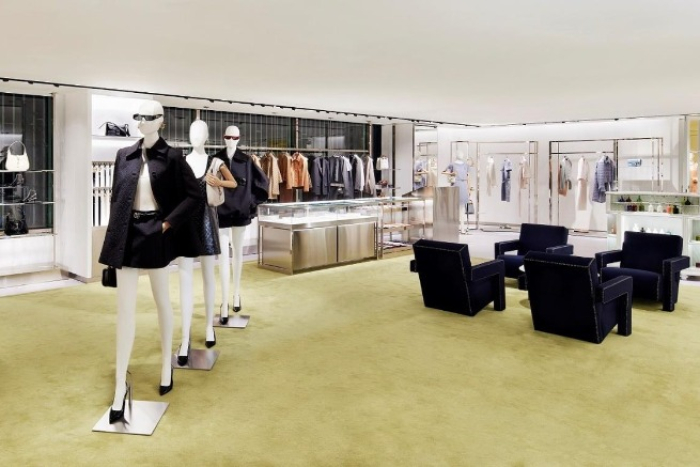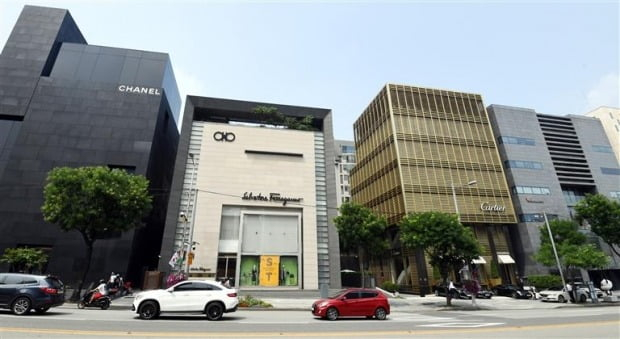Retail
More luxury brands seek Korean market on sales surge
Tiffany & Co. and Loewe will open flagship stores this year; shoppers in their 40s and 50s show their purchasing power
By Jul 16, 2024 (Gmt+09:00)
3
Min read
Most Read
LG Chem to sell water filter business to Glenwood PE for $692 million


Kyobo Life poised to buy Japan’s SBI Group-owned savings bank


KT&G eyes overseas M&A after rejecting activist fund's offer


StockX in merger talks with Naver’s online reseller Kream


Mirae Asset to be named Korea Post’s core real estate fund operator



South Korea’s luxury goods market, estimated at around $7.1 billion, is experiencing a surge in demand led by affluent consumers in their 40s and 50s, and several high-end global luxury brands will launch new stores in Korea to take advantage of the continued market boom.
The sales growth of luxury goods in Korea’s three largest department stores – Shinsegae Department Store, Hyundai Department Store Co. and Lotte Department Store – exceeded the upscale shopping centers’ average revenue growth of 2.6% for the first half of this year.
Shinsegae posted 11.8% luxury goods sales growth from January to June, compared with 7.9% in the same period of last year. Hyundai posted 10.1% in first-half revenue growth, up from 8.3% from a year earlier. Lotte maintained 5% for the first half, according to industry officials on Tuesday.
“In the luxury goods market, demand doesn’t easily drop once it surges,” said a retail industry official.
“Although the sales growth is lower than 20-30% in 2022 when shoppers rushed to revenge spending, consumers with purchasing power are (increasingly) buying luxury goods as demand has recovered since the end of last year,” the official added.
Korea's luxury goods market is projected to reach $7.1 billion this year with an annual growth rate of 4.42% from 2024 to 2028, according to Statista.

CONCENTRATION IN UPSCALE AREA
As an increasing number of luxury brands seek to open or expand their businesses in southern Seoul's Cheongdam-dong, an upscale neighborhood with global high-end brands such as Chanel, Louis Vuitton, Christian Dior and Gucci, the real estate vacancy rate in the area dropped to an estimated 9% as of end-March this year from 20.8% in 2019.
US luxury jewelry design house Tiffany & Co. and Spanish fashion brand Loewe are set to launch their flagship stores later this year in the affluent neighborhood, while Swiss watchmaker Audemars Piguet and Vacheron Constantin will also open their new stores in the area.
Richard Mille, a 23-year-old Swiss watch brand, reopened its boutique store in the expensive neighborhood earlier this month. The three-story building has expanded to 1,000 square meters, featuring Korean traditional architectural design.
Singaporean coffee brand Bacha Coffee will launch its first Korean store in Cheongdam-dong later this month. US athletic apparel retailer Alo Yoga is planning to open its first offline store in Korea in the same area, industry officials said.
“When a global luxury brand plans to launch a new store, it considers the purchasing power of customers and public perception of the area. That is why many high-end brands pick Cheongdam-dong as the location of their flagship stores,” said Kelly Nam, head of new contents and shopping center leasing at Cushman & Wakefield.

EMERGENCE OF BUYERS IN THEIR 40s, 50s
Shoppers in their 40s and 50s have recently emerged as big buyers of luxury goods in Korea, in comparison, Millennials and Gen Z led pandemic-era revenge spending from 2021 to 2022.
Korea’s major credit card company BC Card found that shoppers in their 40s and 50s accounted for some 68.7% of the expenditures in luxury goods stores in Cheongdam-dong in 2023.
Some 15.1% of the consumption was made by those in their 30s, down from 25% last year. In contrast, about 28.8% of the expenditures were made by shoppers in their 50s, up from 20% from a year ago.
Analysts say that the inflation and rate hikes hit the purchasing power of consumers in their 30s, while those in their 40s and 50s with more financial stability increased spending on expensive products.
Shoppers in their 40s and 50s last year increased their spending on luxury brand goods in Cheongdam-dong by 32% and 23%, respectively, compared with 2020.
Consumers in their 20s and 30s cut such spending in the neighborhood by 23% and 42%, respectively, during the same period.
Write to Ji-Yoon Yang at yang@hankyung.com
Jihyun Kim edited this article.
More to Read
-
 Food & BeverageShinsegae Dept. Store to sell luxury wines in Gangnam
Food & BeverageShinsegae Dept. Store to sell luxury wines in GangnamJun 07, 2024 (Gmt+09:00)
1 Min read -
 Travel & LeisureAman, Rosewood, Banyan, IHG rush to open luxury hotels in Seoul
Travel & LeisureAman, Rosewood, Banyan, IHG rush to open luxury hotels in SeoulMay 05, 2024 (Gmt+09:00)
4 Min read -
 RetailUsed goods platform Gugus shines in slowing luxury market
RetailUsed goods platform Gugus shines in slowing luxury marketApr 23, 2024 (Gmt+09:00)
3 Min read -
 Travel & LeisureSouth Korea’s luxury hotels bask in return of tourists post-pandemic
Travel & LeisureSouth Korea’s luxury hotels bask in return of tourists post-pandemicFeb 20, 2024 (Gmt+09:00)
2 Min read -
 Beauty & CosmeticsShinsegae targets global luxury cosmetics market with own brand
Beauty & CosmeticsShinsegae targets global luxury cosmetics market with own brandOct 11, 2023 (Gmt+09:00)
2 Min read
Comment 0
LOG IN


